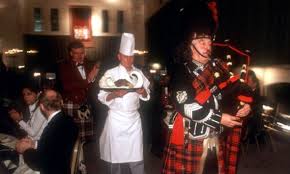Burns Night 2014 is here! To celebrate I’m having a wee dram and reading my favourite poem! I’ve included it at the bottom of this blog – I’m nice like that!
January 25th is a big night for Scottish people everywhere – possibly the biggest night of the year after Hogmanay (the New Year) itself. So as a sassenach (meaning ‘southerner’ and really meaning ‘English person’) what does Burns Night mean to me and what does it involve?
I think that Burns Night is a wonderful event: I am a great fan of ‘The Bard Of Ayrshire’, his poetry is wonderfully evocative and beautifully lyrical even if it can often be unintelligible to those of us born south of the border. Scotland should be proud that their greatest celebration is in honour of a classical poet. England has produced a wealth of great writers but alas we do not recognise them as they deserve: surely there should be a place in our calendar for a ‘Shakespeare Day’ or a ‘Wordsworth Night’?
Back to Rab Burns and his celebratory night. The night opens with a speech from the host in Scottish Gaelic and then grace is said: not any sort of grace though, oh no. This grace goes: “Some hae meat and canna eat/ And some wad eat that want it;/ But we hae meat, and we can eat/ And sae let the Lord be thankit.” If you struggled with that bit, then you are going to find the rest of the night rather incomprehensible.
After grace, the haggis is brought in! Or should I say ‘piped in’? Yes, it would ne’er do to bring the haggis in on a serving pate and plonk it down onto the table – it has to be carried in ceremonially accompanied by the mournful wail of the bagpipes. What is haggis? If you don’t know – it’s best not to ask. Or at least to eat first and ask later.
There now follows the ‘Address to the haggis’: this poem goes on, and on and on but when done well it is fantastic. The climax is when the orator says: “His knife see rustic labour dicht”, at which point the carving knife or sword is drawn, followed by, “An’ cut you up wi’ ready slicht!” whence the haggis is sliced open from end to end.
Whisky is then drunk (this, I find, is the best part of the evening), and food is eaten before a speaker will give a talk about the immortal Robbie Burns himself. There then follows the ‘Toast to the lassies’: this is always a good time for feminists to make themselves scarce, as the speech that follows is rather old school in its views on women.
The women get their own back however, after more whisky, with the ‘Toast to the laddies’. By now most people will be toasted to within an inch of their lives – have a taxi booked in advance.
There then follows a wonderful climax to the evening: singing, music and dancing with Burn’s songs set to wonderful folk music. You can sing along – don’t worry if you don’t know the words to Tam O’Shanter or To A Mouse and the like – after half a dozen big whiskies or so you will sound just like the native gaelic speakers.
The Burns Supper ends with lots of hand crossing and the singing of ‘Auld Lang Syne’ (you will know that one) and then off home it is. What a wonderful and civilised way it is to celebrate the life of one of the greatest poets in the English (ahem) language.
Was Burns as great as I make out? Oh yes. One poem of his in particular holds a dear place in my heart: along with Wilde’s ‘Requiscat’ and Keat’s ‘Ode To A Nightingale’ it is one of my three favourite poems of all time. It is a love poem, and not one that you will hear at Burn’s Night but keep it in mind for Valentine’s day as the perfect serenade for whoever has captured your heart. So here I reproduce a work of genius, enjoy Burn’s Night as you read the greatest and simplest ode to love there has ever been: ‘Oh my luve’s like a red red rose.’
“O my Luve’s like a red, red rose,
That’s newly sprung in June:
O my Luve’s like the melodie,
That’s sweetly play’d in tune.
As fair art thou, my bonie lass,
So deep in luve am I;
And I will luve thee still, my dear,
Till a’ the seas gang dry.
Till a’ the seas gang dry , my dear,
And the rocks melt wi’ the sun;
And I will luve thee still, my dear,
While the sands o’ life shall run.
And fare-thee-weel, my only Luve !
And fare-thee-weel, a while!
And I will come again, my Luve,
Tho’ ’twere ten thousand mile!”
